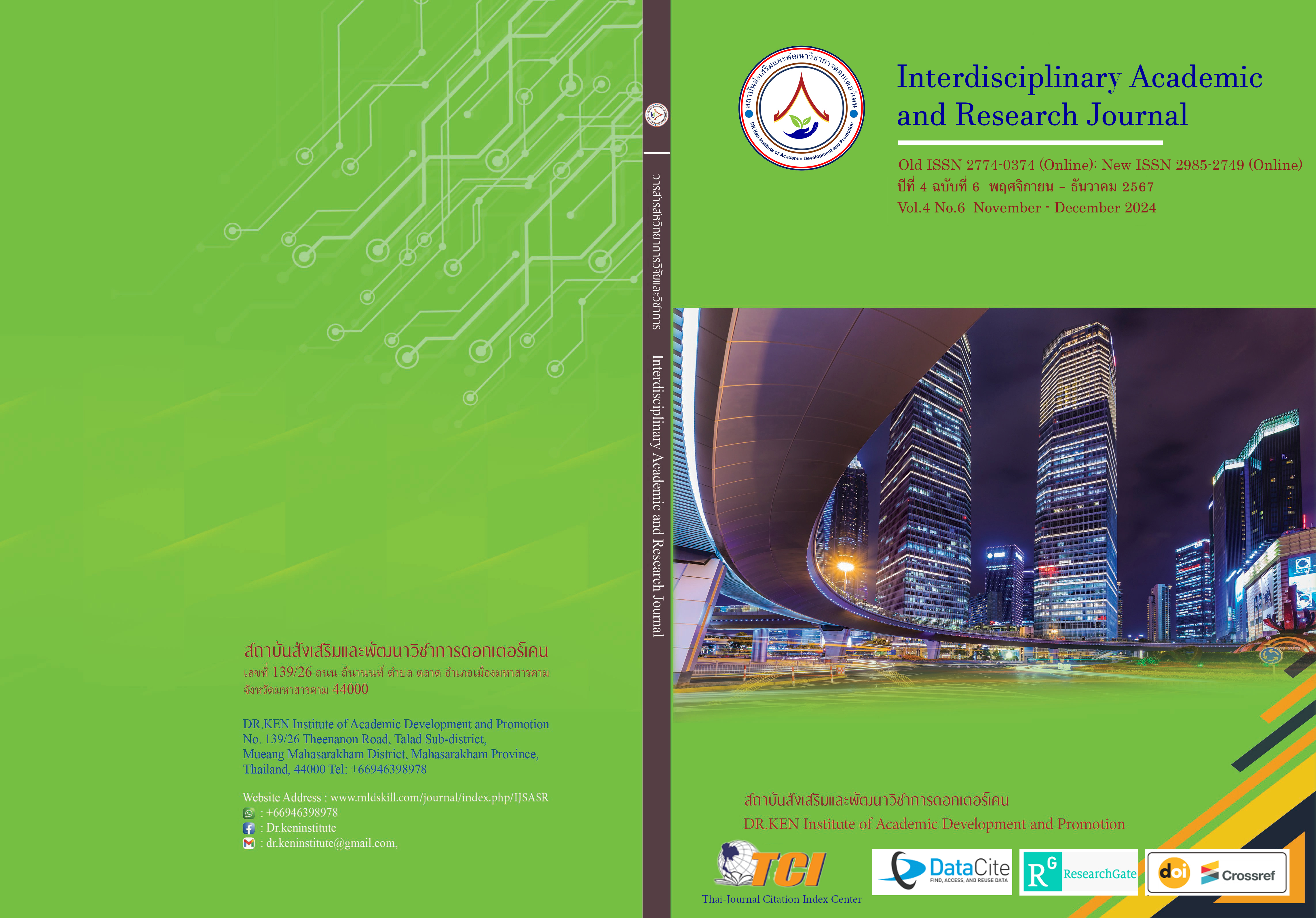Causal Relationship Affecting the Strategic Performance-Based Budgeting of Local Administrative Organization in the Provinces of the Lower Northeastern Region
DOI:
https://doi.org/10.60027/iarj.2024.278400Keywords:
Knowledge Management, Transformational Leadership, Participatory Budgeting Management, Strategic Performance-Based Budgeting of Local Administrative OrganizationAbstract
Background and Aims: Currently, local government budget management offers citizens a chance to be involved in day-to-day operations. Creating community forums, drafting development plans, attending local council meetings, and providing chances for individuals or community organizations to assume collective public management responsibilities are just a few examples. Thus, this paper aims to investigate the causal of knowledge management, transformational leadership, and participatory budgeting management towards the strategic performance-based budgeting of local administrative organizations in the provinces of the lower Northeastern region. This research employed a quantitative research methodology, with 440 questionnaires responded to by staff of local administrative organizations in the provinces of the lower Northeastern region. Descriptive analysis and SEM (Structural Equation Model) were conducted using a statistical package program for data analysis.
Methodology: The results showed that 1) knowledge management has a direct positive impact on strategic performance-based budgeting but it has no significant impact on participatory budgeting management. In addition, knowledge management has an indirect positive impact on strategic performance-based budgeting through participatory budgeting management, 2) transformational leadership has a direct positive impact on strategic performance-based budgeting and also has a significant impact on participatory budgeting management. Moreover, transformational leadership has an indirect positive impact on strategic performance-based budgeting through participatory budgeting management, 3) participatory budgeting management has a direct positive impact on strategic performance-based budgeting.
Results: This research proposes an approach towards achieving a good strategic performance-based budgeting of local administrative organizations in the provinces of the lower Northeastern region. The approach is to primarily establish knowledge management, transformational leadership, and participatory budgeting management to create good strategic performance-based budgeting. This will result in a quality strategic performance-based budgeting that is correct, complete, and punctual which would finally affect the image of local administrative organization.
Conclusion: The model of causal of knowledge management, transformational leadership, and participatory budgeting management towards the strategic performance-based budgeting of local administrative organization in the provinces of the lower Northeastern region corresponds to the empirical data at a very good level (Chi square/df=1.853, P-value=0.551, RMSEA=0.034, GFI=0.901, AGFI=0.980).
References
กรมส่งเสริมการปกครองส่วนท้องถิ่น. (2566). สรุปข้อมูลองค์กรปกครองส่วนท้องถิ่นแยกรายจังหวัด. Retrieved from: https://www.dla.go.th/work/abt/index.jsp
กัลยา วาณิชบัญชา. (2552). การวิเคราะห์สถิติ: สถิติเพื่อการตัดสินใจ. พิมพ์ครั้งที่ 4. กรุงเทพฯ: โรงพิมพ์แห่งจุฬาลงกรณ์มหาวิทยาลัย.
กัลยา วาณิชบัญชา. (2557). การวิเคราะห์สมการโครงสร้าง (SEM) ด้วย AMOS. กรุงเทพฯ: ห้างหุ้นส่วนจํากัดสามลดา.
จินตวีร์ เกษมศุข. (2557). หลักการมีส่วนร่วมกับการพัฒนาชุมชนอย่างยั่งยืน. กรุงเทพฯ: จุฬาลงกรณ์ราชวิทยาลัย.
ชัยสิทธิ์ เฉลิมมีประเสริฐ. (2546). ความพร้อมของหน่วยงานภาครัฐในการบริหารจัดการระบบงบประมาณแบบมุ่งเน้นผลงานตามยุทธศาสตร์ชาติ. พิมพ์ครั้งที่ 2. กรุงเทพฯ: ธนรัชการพิมพ์.
บุษบา บุญกะนันท์. (2561). รูปแบบความสัมพันธ์โครงสร้างเชิงเส้นของปัจจัยที่ส่งผลต่อการบริหารงานโรงเรียนส่งเสริมสุขภาพระดับเพชรของสถานศึกษาขั้นพื้นฐาน. ปรัชญาดุษฎีบัณฑิต สาขาวิชาการบริหารการศึกษา มหาวิทยาลัยราชภัฏบุรีรัมย์.
ประดิษฐ์ ศรีประไหม. (2562). ข้อเสนอเชิงนโยบายการบริหารจัดการงบประมาณแบบมีส่วนร่วมขององค์กรปกครองส่วนท้องถิ่น ในเขตภาคตะวันอออกเฉียงเหนือตอนกลาง. ปร.ด. (การบริหารการพัฒนา) มหาวิทยาลัยราชภัฏสกลนคร.
พุทธิมา ตระการวนิช และคณะ. (2554). ระบบงบประมาณแบบมุ่งเน้นผลงาน กรณีศึกษา นโยบายการแก้ไขปัญหาความยากจนในประเทศไทย. วารสารศรีนครินทรวิโรฒวิจัยและพัฒนา. 3(5), 63-81.
เพ็ญแข สนิทวงศ์ ณ อยุธยา. (2548). การงบประมาณ. พิมพ์ครั้งที่ 11. กรุงเทพมหานคร: จุฬาลงกรณ์มหาวิทยาลัย.
สำนักงบประมาณ. (2562). ระเบียบว่าด้วยการบริหารงบประมาณ พ.ศ. 2562. กรุงเทพฯ: สำนักงบประมาณ.
สำนักงานคณะกรรมการพัฒนาการเศรษฐกิจและสังคมแห่งชาติ.(2560). แผนพัฒนาเศรษฐกิจและสังคมแห่งชาติ ฉบับที่ 12 (พ.ศ. 2560 – 2564). https://www.nesdc.go.th/ewt_dl_link.php?nid=6422
สิริรักษ์ นักดนตรี และยศวีร์ สายฟ้า. (2561). แนวทางการพัฒนาภาวะผู้นำการเปลี่ยนแปลงในการบริหารโรงเรียนสู่การเป็นชุมชนแห่งการเรียนรู้อย่างมืออาชีพสังกัดสำนักงานเขตพื้นที่การศึกษามัธยมศึกษาเขต 5. An Online Journal of Education, 13(3), 277–289. Retrieved from https://so01.tci-thaijo.org/index.php/OJED/article/view/200667.
อัญญกฤตา หัตถีรัตน และพงษ์เสฐียร เหลืองอลงกต. (2563). ปัจจัยที่มีอิทธิพลต่อการบริหารงบประมาณแบบมุ่งเน้นผลงานตามยุทธศาสตร์ขององค์กรปกครองส่วนท้องถิ่นในจังหวัดนครสวรรค์. วารสาร มจร สังคมศาสตร์ปริทรรศน์. 9(2), 140-155.
Alqatawenah, A.S. (2018). Transformational leadership style and its relationship with change management. Verslas Teorija ir Praktika 19(3), 17-24.
Awad, M.A., & Ghaziri. H.M. (2004). Knowledge Management. Pearson Education
Barbuto, J. E., & Burbach, M. E. (2006). The Emotional Intelligence of Transformational Leaders: A Field Study of Elected Officials. The Journal of Social Psychology, 146, 51-64. https://doi.org/10.3200/SOCP.146.1.51-64
Basuki, F.H. (2015). Assessment of Financial Performance: Transformational Leadership and Budget Participation Effect with Mediating of Strategy Management: Study of Indonesian Hospitals. Research Journal of Finance and Accounting. 6(2), 11-14.
Beesley, L., & Cooper, C. (2008). Defining knowledge management (KM) activities: Towards consensus. Journal of Knowledge Management. 12 (3), 48-62.
Bocatto, E., & Toledo, E.P. (2020). Knowledge acquisition and meaning-making in the participatory budgeting of local governments. The Electronic Journal of Knowledge Management. 18(2), 149-160.
Cohen, J., & Uphoff, N. (1977). Rural Development Participation: Concepts and Measures for Project Design, Implementation and Evaluation. Cornel University, Ithaka.
Diamantopoulos, A., & Siguaw, J.A. (2000). Introducing LISREL. London: Sage
Fachrizal, M., Lalu, S., & Animah, A. (2016). B8 The effect of participatory budgeting on the performance of government officials (An empirical study in West Lombok District). The Indonesian Accounting Review. 6, 181-194.
Hair, J.F., Black, W.C., Babin, B.J., & Anderson, R.E. (2010). Multivariate Data Analysis. 7th Edition, Pearson, New York.
Hemali, O.A., & Tahajuddin, S.B. (2018). The influence of budgetary participation on knowledge sharing among budget prepares within Libyan public industrial companies. European Journal of Business and Social Sciences. 6(11), 91-106.
Kim, Y.-C., & Kang, J. (2010). Communication, Neighbourhood Belonging, and Household Hurricane Preparedness. Disasters, 34, 470-488. http://dx.doi.org/10.1111/j.1467-7717.2009.01138.x.
Mischen, P.A., & Sinclair, T.A.P. (2017). Small is Beautiful: Knowledge Management and Budget Reform in a Rural County. The Innovation Journal: The Public Sector Innovation Journal, 22(1), article 2
Nutt: C., & Wilson, D.C. (2010). Handbook of Decision Making. New York: John Wiley and Sons.
Pratolo, S., Mukti, A. H., & Sofyani, H. (2021). Intervening Role of Performance-Based Budgeting in the Relationship between Transformational Leadership, Organizational Commitment, and University Performance. Journal Dinamika Akuntansi dan Bisnis. 8(1), 77-90.
Putri, D.K. (2021). The Influence of Transformational Leadership Style, Human Resources Competency Towards Implementation Performance Based Budgeting and Organization Culture: Study on Government Working Unit of Situbondo Regency, ast Java. Journal of Contemporary Information Technology, Management, and Accounting. 2(1), 28-34.
Robbins, S.P. (2003). Organizational behavior. 10th edition. San Diego: Prentice Hall.
Downloads
Published
How to Cite
Issue
Section
License
Copyright (c) 2024 Interdisciplinary Academic and Research Journal

This work is licensed under a Creative Commons Attribution-NonCommercial-NoDerivatives 4.0 International License.
Copyright on any article in the Interdisciplinary Academic and Research Journal is retained by the author(s) under the under the Creative Commons Attribution-NonCommercial-NoDerivatives 4.0 International License. Permission to use text, content, images, etc. of publication. Any user to read, download, copy, distribute, print, search, or link to the full texts of articles, crawl them for indexing, pass them as data to software, or use them for any other lawful purpose. But do not use it for commercial use or with the intent to benefit any business.
















.png)


